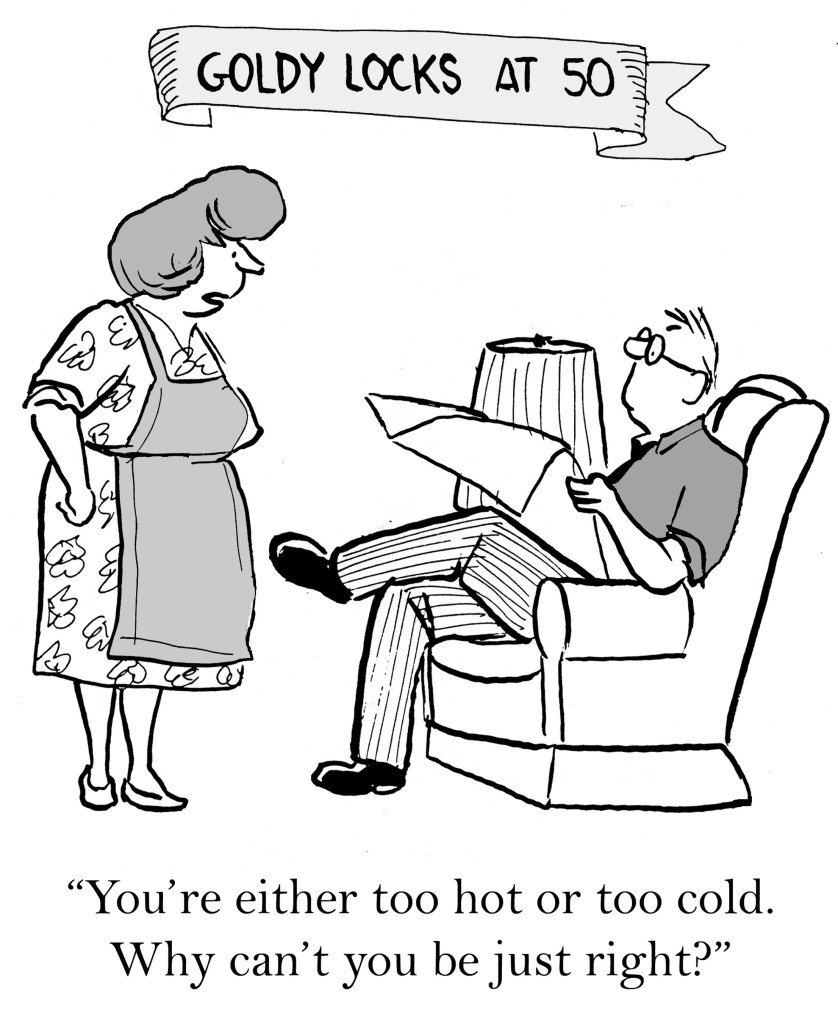 Menopause. The change. An uncertain time in a woman’s life when her body makes permanent, and unfamiliar changes. For the millions of women who go through menopause each year, the symptoms of this altering state can feel overwhelming, leading many women to dread the day that they realize menopause has arrived. If you are experiencing menopause now, or are anticipating the day when the first signs or symptoms appear, familiarize yourself with our tips for easing the symptoms of menopause so that when the change does occur, you can face it confidently and without distress.
Menopause. The change. An uncertain time in a woman’s life when her body makes permanent, and unfamiliar changes. For the millions of women who go through menopause each year, the symptoms of this altering state can feel overwhelming, leading many women to dread the day that they realize menopause has arrived. If you are experiencing menopause now, or are anticipating the day when the first signs or symptoms appear, familiarize yourself with our tips for easing the symptoms of menopause so that when the change does occur, you can face it confidently and without distress.
Symptoms of Menopause
The symptoms that women experience during menopause — while varied — are primarily caused by a single factor: hormone changes. While every woman’s experiences will be different, what follows is a list of the most common symptoms that women experience during menopause:
• Hot flashes — a sensation of heat all over the upper body and/or flushing of the face and neck.
• Vaginal dryness, which can lead to discomfort during sex.
• Irregular periods that come more or less frequently than experienced previously.
• Periods that last for more or fewer days than experienced previously.
• Periods that are noticeably heavier or lighter than experienced previously.
• Night sweats.
• Difficulty sleeping.
• Mood swings—crying more frequently, seemingly without reason.
• Urinary tract infections.
• Urinary incontinence.
• Disinterest in sex, or feeling more comfortable about sex.
• Forgetfulness/difficulty focusing.
• Feeling stiff or achy.
Easing the Symptoms of Menopause
If you are experiencing any of these symptoms, know that you don’t have to suffer. Much of the discomfort associated with this phase of life can be treated with simple lifestyle changes and at-home remedies. Follow these tips to help ease your symptoms.
To Treat Hot Flashes:
- Avoid triggers such as spicy foods, alcohol, stress, caffeine, and hot locations.
- Dress in layers.
- Make sure you have a fan conveniently located in your home or workplace.
- When you feel a hot flash coming on, take deep, slow breaths.
To Treat Vaginal Dryness:
- To ease discomfort during sex, use a water-based, over-the-counter vaginal lubricant.
- To assist general feelings of dryness, use an over-the-counter vaginal moisturizer.
To Treat Sleep-Related Issues:
- Remaining active during the day will help you feel restful at night. Do not exercise too close to bedtime however, as such physical activity may make you feel awake immediately following.
- Avoid large meals directly before bed, and do not consume caffeine after noon.
- Do not smoke directly before bed.
- Keep your bedroom cool.
- Avoid naps during the day.
- Try to wake up and go to bed at the same time every day.
To Treat Mood Swings:
- Stay active during the day, and try to get regular sleep at night.
- Work to manage the stress factors in your life.
- Talk to your doctor to determine if you are experiencing depression and could benefit from more focused depression treatment.
To Treat Memory Problems:
- Stay active during the day, and try to get regular sleep during the night.
- To Treat Urinary Incontinence:
- Talk to your OBGYN. There may be medicines, behavioral changes, or devices that may ease your symptoms.
Hormone Therapy:
- Menopausal hormone therapy (MHT) can be an effective treatment for several of the symptoms of menopause, including vaginal dryness, mood swings, hot flashes, and night sweats.
- Low-dose oral contraceptives may help to ease symptoms if you are still receiving your period.
Feeling overwhelmed? Don’t feel like menopause is beyond your control. Start by talking to your OBGYN. He/she can help you to address your specific symptoms and devise a treatment plan that will suit your needs and ease your discomfort.
More
 The Three Biggest Health Factors Women
The Three Biggest Health Factors Women
Should Focus on After Age 50
Fifty is the new forty. Today’s health conscious middle aged women are working to stay healthy as they age gracefully. It’s important to understand that the health goals you set for yourself at age 50 should be different than they were when you were in your forties and thirties. If you are over fifty, the three biggest health factors that you should focus on to help you maintain your overall wellbeing include regulating your blood sugar levels, protecting your bones, and keeping your heart healthy.
Healthy Sugar Levels
Much has been said about the dangers of a high sugar diet. For women over age fifty, keeping sugar levels in check is especially important for maintaining a healthy weight, and a healthy heart. The ability to regulate blood sugar is more difficult over age 50. Strive to keep your blood glucose level in a healthy range by eating high quality foods and staying active. Check the ingredients in the packaged foods you eat and limit products with added sugar and artificial sweeteners. Avoid sugary drinks like soda and sweetened coffee and tea. Replace these empty calorie beverages with water, and add a squeeze of lemon or lime for a natural sweetener instead.
Healthy Bones
During menopause, as estrogen levels dip, a woman’s rate of bone breakdown increases while the rate of new bone formation slows, putting you at risk for osteoporosis. To protect your bones as you age, talk to your doctor about your risks for osteoporosis. He/she will likely recommend regular bone density screenings once you reach age 65, but depending on your health history, your doctor may suggest earlier screenings. To further protect your bone health, make sure your diet includes plenty of calcium. Aim for at least 1,200 milligrams per day from calcium-rich foods like milk, kale, sardines, and yogurt. Your doctor may also recommend a daily supplement to help you reach your calcium intake goals.
Healthy Heart
As women age, and especially after menopause, they lose some of their bodies’ natural defenses against heart disease. Women over age 50 are also at greater risk for developing high cholesterol levels, and type 2 diabetes – two heart health related conditions that can have deadly consequences. To protect your heart long-term, be sure to eat a diet that includes fruits, vegetables, fiber, lean proteins, and healthy fats. The best foods to incorporate into your diet include salmon, walnuts, low-fat milk, oatmeal, and olive oil. In addition to maintaining a healthy diet, it is important to stay active. Just 30 minutes of physical activity a day will help protect your heart as you age.
Remember that staying healthy at any age doesn’t have to be overwhelming. The core of any health routine is to maintain a healthy diet and to stay active. Over age 50, if you work with your doctor to particularly monitor your blood sugar levels, bone density, and heart health, you will be putting yourself in the best position to maintain your overall wellbeing long into the future.
More
 Sex should be a pleasing, and comfortable experience, so when our bodies inhibit our ability to truly enjoy intimate moments, it can be frustrating and discouraging–which may only further inhibit our ability to relax and enjoy the experience. Vaginal dryness is a condition that affects a significant number of women, but older women are particular susceptible. Vaginal dryness impacts more than half of post-menopausal women between the ages of 51 and 60. During menopause, women produce lower levels of the hormone estrogen. As a result, vaginal walls lose their elasticity, become tight and fragile, and are less able to accommodate the flexibility needed for comfort during sexual intercourse. In the most serious of cases, the vaginal walls can even tear or bleed during sex. If you are among the millions of women suffering from vaginal dryness, read the tips below to learn how to ease your symptoms and take back your comfort and confidence in the bedroom.
Sex should be a pleasing, and comfortable experience, so when our bodies inhibit our ability to truly enjoy intimate moments, it can be frustrating and discouraging–which may only further inhibit our ability to relax and enjoy the experience. Vaginal dryness is a condition that affects a significant number of women, but older women are particular susceptible. Vaginal dryness impacts more than half of post-menopausal women between the ages of 51 and 60. During menopause, women produce lower levels of the hormone estrogen. As a result, vaginal walls lose their elasticity, become tight and fragile, and are less able to accommodate the flexibility needed for comfort during sexual intercourse. In the most serious of cases, the vaginal walls can even tear or bleed during sex. If you are among the millions of women suffering from vaginal dryness, read the tips below to learn how to ease your symptoms and take back your comfort and confidence in the bedroom.
- Foreplay. It may sound like a simple solution, but too often the many constraints on our time cause us to rush sexual intercourse. Without proper foreplay, we don’t allow our bodies the time necessary to properly self-lubricate and prepare for penetration. By increasing the length of foreplay, a woman can naturally improve her moisture levels and reduce dryness.
- Vaginal lubricants. These over-the-counter products are intended to be used during sexual intercourse to help ease repeated penetration by temporarily providing a more slippery surface. Avoid products that boast unnecessary features like flavors and scents, and choose a product that will meet your needs by improving your comfort.
- Vaginal moisturizers. For many women suffering from vaginal dryness, a simple over-the-counter vaginal moisturizer applied regularly can greatly improve wetness and comfort during sex. Similar to body lotion, vaginal moisturizers can be used as a maintenance product to reduce dryness and improve daily moisture levels.
- Vaginal estrogen treatment. The most effective treatment for moderate to severe cases of vaginal dryness is a vaginal estrogen treatment. By increasing estrogen levels in the body, vaginal walls are restored to their pre-menopausal thickness, and will produce greater levels of vaginal mucus and secretions. There are three treatment options for vaginal estrogen. Treatment can be obtained in the form of an oral tablet, vaginal cream, or vaginal ring, which lasts for three months before needing to be replaced. Women at high risk for breast cancer should avoid estrogen supplements, especially if taking aromatase inhibitors to lower their breast cancer risk.
- Selective estrogen receptor modulators (SERM). SERMs are taken orally to help restore vaginal moisture and mucous. Ask your GYN if a SERM treatment may be right for you, but know that such oral treatments may increase your risk of blood clots and hot flashes.
- Vaginal dilators. In the most serious cases of vaginal dryness, the treatments above many not be enough. Prescription vaginal dilators are soft plastic rods in gradual sizes, ranging from three millimeters to ten millimeters in diameter. Their repeated insertions help allow for a gradual increase in overall vaginal dilation capabilities.
Most importantly, you don’t have to shy away from sex. When sex becomes uncomfortable, a natural reaction can be to avoid intercourse – and the pain associated. However, continued sexual activity, including masturbation, allows the vagina to maintain a greater level of elasticity over time. By continuing to be sexually active (safely of course!) you can slow and lessen the signs of vaginal drying, even during menopause.
The doctors at Chouchani, Sayegh and Bagnarello can help you with any question about your sexual health. Contact us today to make an appointment. We are currently accepting new patients.
More
 You’re having an ordinary day when suddenly an overwhelming sensation of heat starts to creep up your neck and into your face. You start to feel a tingling sensation in your fingertips, and as your face starts to flush and beads of sweat form along your brow, you realize that your heart rate has escalated too. Unless you’re playing beach volleyball on a 90 degree day in Miami, you may be experiencing a hot flash. For many women, hot flashes are one of the most uncomfortable symptoms of menopause and perimenopause (the period of time directly preceding the onset of menopause). It is not clear exactly what causes hot flashes but it is believed that the sensations of overwhelming heat are due to hormonal changes that occur in a woman’s body or to changes in circulation. While you may not be able to avoid hot flashes completely during perimenopause and menopause, knowing what triggers them and how to manage your symptoms can help ease the discomfort.
You’re having an ordinary day when suddenly an overwhelming sensation of heat starts to creep up your neck and into your face. You start to feel a tingling sensation in your fingertips, and as your face starts to flush and beads of sweat form along your brow, you realize that your heart rate has escalated too. Unless you’re playing beach volleyball on a 90 degree day in Miami, you may be experiencing a hot flash. For many women, hot flashes are one of the most uncomfortable symptoms of menopause and perimenopause (the period of time directly preceding the onset of menopause). It is not clear exactly what causes hot flashes but it is believed that the sensations of overwhelming heat are due to hormonal changes that occur in a woman’s body or to changes in circulation. While you may not be able to avoid hot flashes completely during perimenopause and menopause, knowing what triggers them and how to manage your symptoms can help ease the discomfort.
Women may experience hot flashes for only a few months during perimenopause, or for several years. Common triggers for hot flashes vary for each woman, but commonly, momentary hot flashes can be brought on by:
- Alcohol consumption
- Caffeine consumption
- Eating spicy foods
- Being located in a warm room
- Stress or anxiety
- Wearing tight clothing
- Tobacco products or exposure to second hand smoke
Take note of when your hot flashes occur and try to identify the specific triggers that you are most susceptible to so that you can try to avoid them in the future. If you can’t control when your hot flashes occur, know that you can still manage your discomfort when a hot flash begins. Some simple strategies to help manage your symptoms include:
- Dressing in layers
- Sipping ice water when you feel a hot flash coming on
- Applying an ice pack to your neck and chest to help lower your body temperature
- Keeping your bedroom cool at night
- Using fans to circulate the air around you
- Wearing cotton, a breathable fabric, at night, and using cotton bed linens
- Regular exercise
- Eating a well-balanced diet
- Practicing deep, slow, abdominal breathing
- Meditation
- Routine acupuncture treatments
For women who feel a more aggressive treatment is needed to manage their symptoms, hormone replacement therapy (HRT) may be an option. HRT uses estrogen supplements to help normalize hormone levels and reduce the incidence of severe hot flashes and night sweats. Other prescription treatments for hot flashes include:
- Low-doses of anti-depressants
- Clonidine, a blood pressure medication
- Gabapentin, an anti-seizure medication
- Brisdelle or Duavee, medications created specifically to treat hot flashes
Nonprescription treatments for hot flashes include:
- Vitamin B complex
- Vitamin E
- Ibuprofen
If you are struggling to manage your hot flashes speak with your gynecologist. He or she will help you decide what triggers to avoid and what treatments may best soothe your symptoms to ensure your years of menopause are not spent in discomfort. And if you are looking for a new Ob-Gyn and are in the Buffalo NY area, please give us a call.
More
 Of all of life’s changes that impact a woman’s body, none may be as unpredictable as menopause. During both perimenopause, the time period shortly before menopause, and menopause, a woman’s estrogen levels fluctuate as her ovaries try to accommodate changing levels of hormone production. As a result, women may experience such uncomfortable symptoms as mood swings, depression, hot flashes, breast pain, and sleeplessness. If you are going through the phases of menopause, you don’t have to suffer. Follow these nine tips to help manage your symptoms and ease through the stages of life’s most unpredictable change.
Of all of life’s changes that impact a woman’s body, none may be as unpredictable as menopause. During both perimenopause, the time period shortly before menopause, and menopause, a woman’s estrogen levels fluctuate as her ovaries try to accommodate changing levels of hormone production. As a result, women may experience such uncomfortable symptoms as mood swings, depression, hot flashes, breast pain, and sleeplessness. If you are going through the phases of menopause, you don’t have to suffer. Follow these nine tips to help manage your symptoms and ease through the stages of life’s most unpredictable change.
- Exercise regularly. Exercising at least 20 minutes three times a week can help to ease hot flashes by lowering the amount of circulating follicle stimulating hormone (FSH) and luteinizing hormone (LH) in your body.
- Reclaim your balance with yoga. Many women report that one of the most frustrating side effects of menopause is an increased feeling of stress and agitation. Meditation and yoga are two calming practices that can help women to feel more relaxed and comfortable during menopause, improving their mood and positively affecting their endocrine system.
- Protect your body from bone loss. During menopause, women should increase the amount of both calcium and vitamin C in their diet to help limit bone loss, another commonly occurring side effect of changing levels of estrogen.
- Consider acupuncture. Acupuncture and acupressure have been known to limit hot flashes for many women and can be used effectively as a treatment for this uncomfortable symptom.
- Maintain a healthy level of cholesterol. For women who experience an increase in cholesterol levels during menopause, a transition to a low-fat and low calorie diet can help to keep their cholesterol at a healthy level. Menopausal women should especially eliminate foods from their diet that are high in animal fat.
- Get a good night’s sleep. Sleeplessness can be one of the most disruptive (and annoying) side effects of menopause. A natural way to improve your quality of sleep is to drink calming chamomile tea before bedtime, wind down by reading a book and limiting TV time, and set a sleep schedule and try to stick to it.
- Increase Vitamin D intake. Vitamin D offers several health benefits for women during menopause, including the promotion of healthy bone renewal, normal cell growth, and hormonal balance. A 15 – 20 minute walk in the sunshine can provide a woman with the necessary daily dose of Vitamin D to experience these benefits.
- Challenge your mind. Many women experience difficulty concentrating, or even memory loss, during menopause. Routinely participating in mind exercises, such as crossword or Sudoku puzzles, can help to challenge your mind and sharpen your memory.
- Avoid hot flash triggers. Some external factors may increase the likelihood of experiencing a hot flash. Women during menopause should wear light clothing, keep their bedroom cool at night, avoid eating spicy foods, drinking caffeine or alcohol, and smoking tobacco.
Menopause is a transformative stage in a woman’s life. The uncomfortable symptoms of menopause will not last forever. By leading a healthy lifestyle and making some simple lifestyle changes, women can ease through the transition of menopause with comfort and ease.
More
 Hormone replacement therapy, or HRT, was once called the “Elixir of Youth.” Women’s doctors gave them medications containing female hormones to replace the ones the body doesn’t make after menopause, using HRT to treat menopausal symptoms. It was also thought to help prevent heart disease and possibly dementia.
Hormone replacement therapy, or HRT, was once called the “Elixir of Youth.” Women’s doctors gave them medications containing female hormones to replace the ones the body doesn’t make after menopause, using HRT to treat menopausal symptoms. It was also thought to help prevent heart disease and possibly dementia.
Then, large clinical trials showed health risks.
What are the current recommendations?
Doctors no longer prescribe hormone therapy for heart disease or memory loss prevention. However, further research and new evidence show that hormone therapy may be a good choice for certain women, depending on their risk factors.
Who should consider hormone therapy?
The benefits of hormone therapy may outweigh the risks if you’re healthy and:
- Experience moderate to severe hot flashes or other menopausal symptoms
- Have lost bone mass and either can’t tolerate or aren’t benefitting from other treatments
- Stopped having periods before age 40 (premature menopause) or lost normal function of your ovaries before age 40 (premature ovarian insufficiency)
Why? Because women who experience early menopause, particularly those who had their ovaries removed, have a higher risk of:
- Coronary heart disease
- Earlier death
- Parkinsonism (Parkinson’s-like symptoms)
- Dementia
- Anxiety or depression
- Sexual function concerns
Who should avoid hormone therapy?
Women with current or past history of breast, ovarian or endometrial cancer, blood clots to the legs or lungs, stroke or liver disease should not take hormone therapy. Smokers should also not take hormone therapy.
If your menopause symptoms started after age 45 and are not bothersome, you shouldn’t need hormone therapy to stay healthy. There are other strategies you can follow to reduce the risk of conditions such as osteoporosis and heart disease.
If you use hormone therapy, how can you reduce risk?
Work with your doctor to:
- Find the best product and delivery method for you. You can take estrogen in the form of a pill, patch, gel, or vaginal cream, ring or suppository.
- Minimize the amount of medication you take. Use the lowest effective dose for the shortest amount of time needed to treat symptoms.
- Have regular screenings such as mammograms and pelvic exams and keep in touch with your health care provider to ensure that the benefits of hormone therapy continue to outweigh the risks.
- Make healthy lifestyle choices, such as exercising, eating a healthy diet, maintaining a healthy weight and managing chronic health conditions such as high cholesterol or high blood pressure.
Your age, type of menopause and time since menopause began play a significant role in the risks associated with hormone therapy. Educate yourself and talk with your doctor about your personal risks.
At Chouchani, Sayegh and Bagnarello, we talk to each and every patient about making the best possible choices for their health. If you’d like to work with a practice that cares, please call any time.
Photo courtesy of freedigitalphotos.net.
More
Menopause is something only old ladies get, right? At the very least, it’s something your grandmother or your mom goes through.
Actually, approximately 1 in every 1000 women between the ages of 15-29 and 1 in every 100 women between the ages of 30-39 develop premature menopause—that is, menopause that occurs before the age of 40.
Women may hit menopause early due to genetics, illness, or medical procedures. Some common genetic conditions that cause it include a history of the condition among the women in your family or an autoimmune condition such as hypothyroidism, Crohn’s disease, lupus or rheumatoid arthritis. But in the vast majority of cases, the cause can’t be found.
Illnesses and medical procedures that can bring on premature menopause include:
- Chemotherapy or pelvic radiation treatments for cancer. These treatments can damage the ovaries and cause your periods to stop.
- Surgery to remove the ovaries. Surgical removal of both ovaries causes menopause right away. A woman’s periods will stop after this surgery, and her hormones drop quickly.
- Surgery to remove the uterus. Some women who have a hysterectomy are able to keep their ovaries, but because their uterus is removed, they no longer have their periods. The surgery can sometimes affect the blood supply to the ovaries, too. Menopause may not be immediate but often occurs a year or two earlier than expected.
How do I know if I have early menopause?
If you are under the age of 40 and haven’t had your period for 12 months in a row, talk to your doctor. The first thing to discuss is whether you’ve had signs like hot flashes, sleep problems and vaginal dryness. The next step is to run some blood tests that can measure estrogen and related hormones. Because your hormone levels change daily, you may need to be tested more than once to know for sure.
Why should I worry about going through early menopause?
Just like any menopausal woman, women in premature menopause experience lowered estrogen levels as the ovaries stop most of their production of this hormone. And these low levels of estrogen can increase your risk for certain medical conditions, such as osteoporosis, colon and ovarian cancer, periodontal (gum) disease, tooth loss and cataract formation. Early menopause means you’ll spend a greater portion of your life without the protective benefits of your own estrogen.
Chouchani, Sayegh and Bagnarello is a premier OB-GYN practice located in Western New York. We were established over 30 years ago with two generations of experience. If you’re worried about any changes you’re noticing in your cycle or your body, contact your doctor or call us here at Chouchani, Sayegh and Bagnarello at 716.633.6363. We’d be happy to discuss your symptoms with you.
More
 Menopause. The change. An uncertain time in a woman’s life when her body makes permanent, and unfamiliar changes. For the millions of women who go through menopause each year, the symptoms of this altering state can feel overwhelming, leading many women to dread the day that they realize menopause has arrived. If you are experiencing menopause now, or are anticipating the day when the first signs or symptoms appear, familiarize yourself with our tips for easing the symptoms of menopause so that when the change does occur, you can face it confidently and without distress.
Menopause. The change. An uncertain time in a woman’s life when her body makes permanent, and unfamiliar changes. For the millions of women who go through menopause each year, the symptoms of this altering state can feel overwhelming, leading many women to dread the day that they realize menopause has arrived. If you are experiencing menopause now, or are anticipating the day when the first signs or symptoms appear, familiarize yourself with our tips for easing the symptoms of menopause so that when the change does occur, you can face it confidently and without distress.



